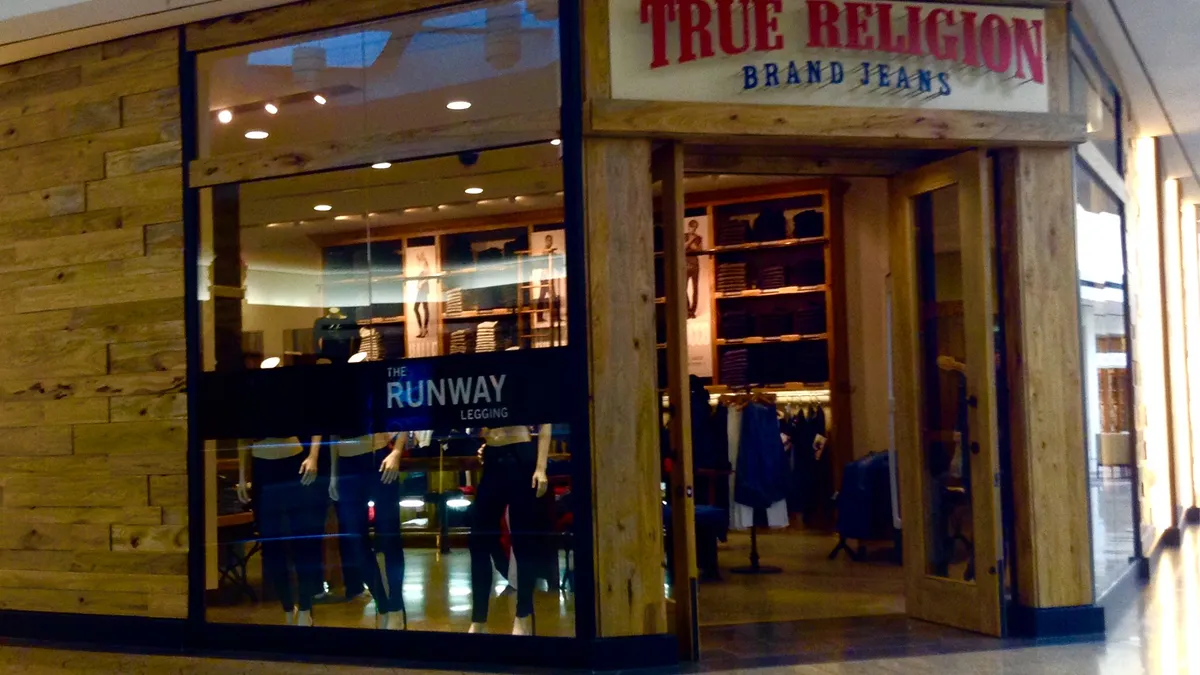Dive Brief:
- Denim brand and retailer True Religion filed for Chapter 11 on Monday, its second bankruptcy since 2017.
- The company had been racking up losses and struggled with liquidity all last year, according to True Religion interim CFO Richard Lynch. The COVID-19 pandemic forced it to close its doors and wiped out 80% of its sales, resulting in even deeper liquidity woes and making bankruptcy "unavoidable," Lynch said in court documents.
- In Chapter 11, True Religion seeks new financing and a court order that would allow it to skip rent for 60 days as it keeps its stores closed amid the pandemic.
Dive Insight:
True Religion is the first major retailer to file amid the disruption to retail caused by the spread of COVID-19. Many more could follow once stores re-open.
The company made the decision in March to close its 87 stores, Lynch said in court papers. In a second blow, the denim maker's wholesale business has been hurt by other retail closures. Its retail partners include Macy's, Nordstrom, Saks Off 5th, Nordstrom Rack, TJ Maxx and Burlington, which have all shuttered their footprints as well.
Unlike retail bankruptcies preceding it (including True Religion's first Chapter 11), the company didn't file primarily to shed debt and stores. In fact, it would be extremely challenging for any retailer to close stores right now according to the timeline outlined in the U.S. bankruptcy laws, given that most discretionary retail stores around the country are closed by government order or company decision, making going-out-of-business sales impossible.
Instead, True Religion is desperately seeking financing and requesting court relief from its rent obligations. Like many retailers that have closed their stores, True Religion has already furloughed much of its staff, along with reducing executive pay. And it's also not alone in seeking rent relief, though it's the first major retailer to enter bankruptcy with such a request.
Founded in 2002 by Jeff Lubell, True Religion made a trip in and out of bankruptcy in 2017, a year that saw more than 20 major retail bankruptcies. Like many of them, True Religion carried debt from a private equity buyout that ran into changing consumer tastes and behaviors.
The company re-engineered its balance sheet in Chapter 11, but problems persisted. Profits and sales started falling in 2019 because of "product designs which were not attractive to True Religion's traditional customer base," as well as e-commerce discounting to clear slow-moving inventory, Lynch said.
For the 12 months ending Feb. 1 — well before the pandemic ripped through the U.S. — True Religion posted a net loss of $50 million on $259 million of revenue, according to Lynch. The company responded by changing out CEOs, cost cutting, re-focusing product range and other measures. It also tried to negotiate an out-of-court deal with its lenders in early March.
And then disaster hit. Analysts think the pandemic could knock out many retailers that were on the edge and already in distress, and potentially create newly distressed retailers as companies burn through their liquidity and face potentially more than a year of depressed sales.
Lynch said that True Religion planned to open "many" of its stores "as soon as practical." But that could depend on the particulars of the company's Chapter 11 case and the pandemic itself.














